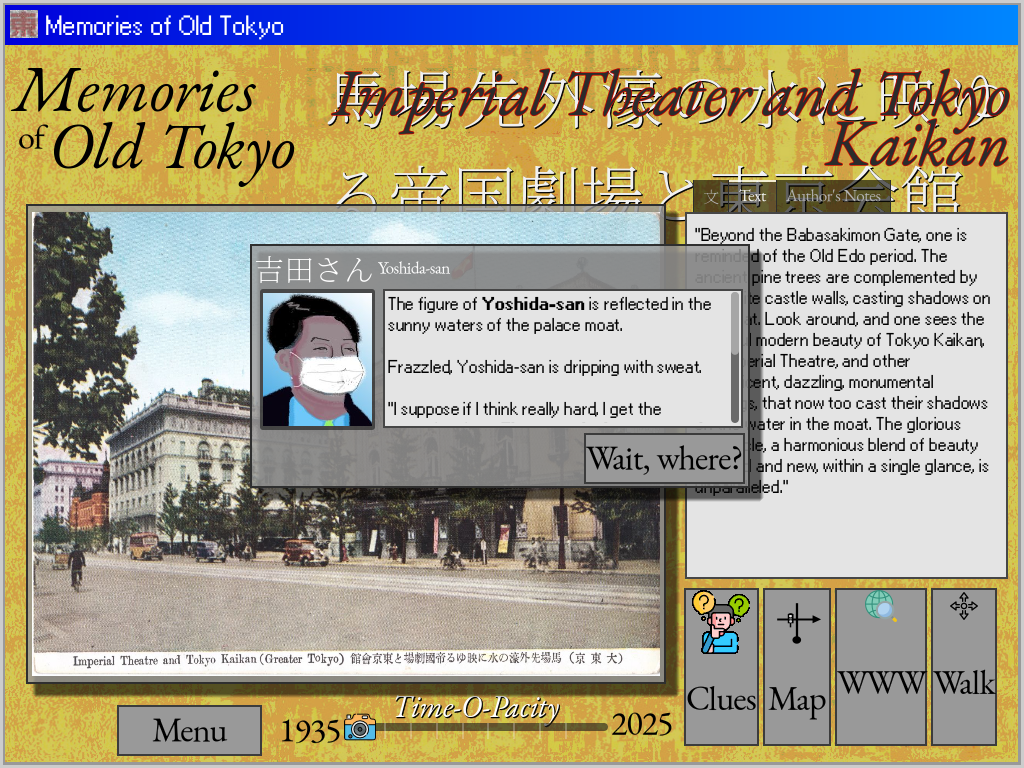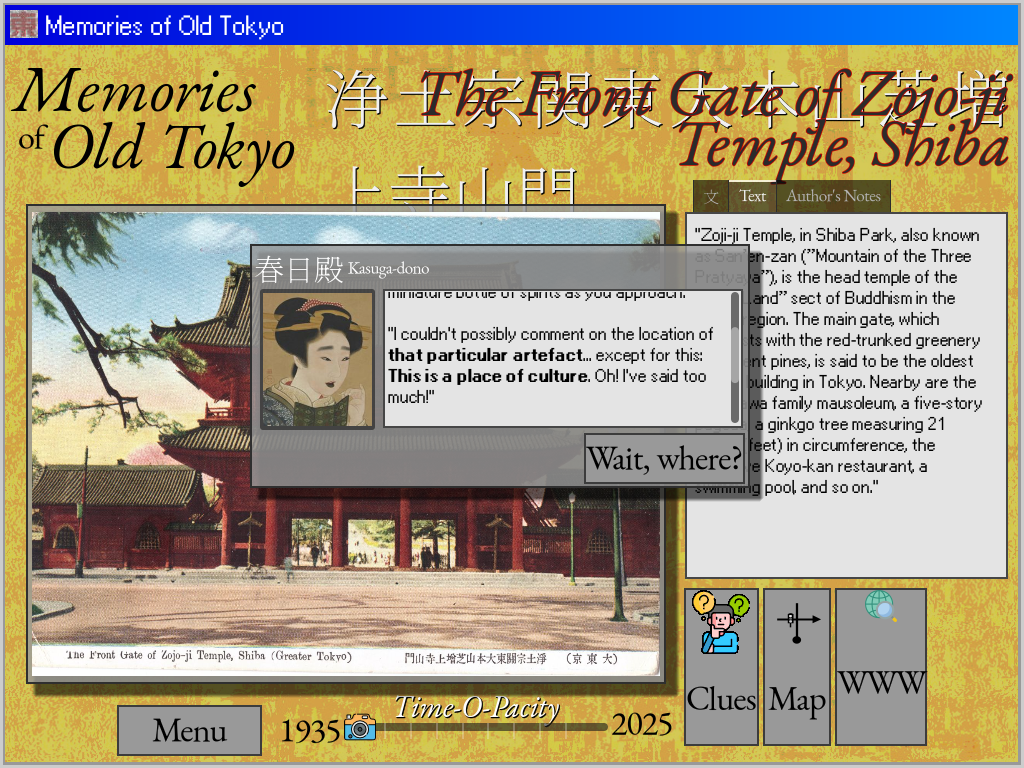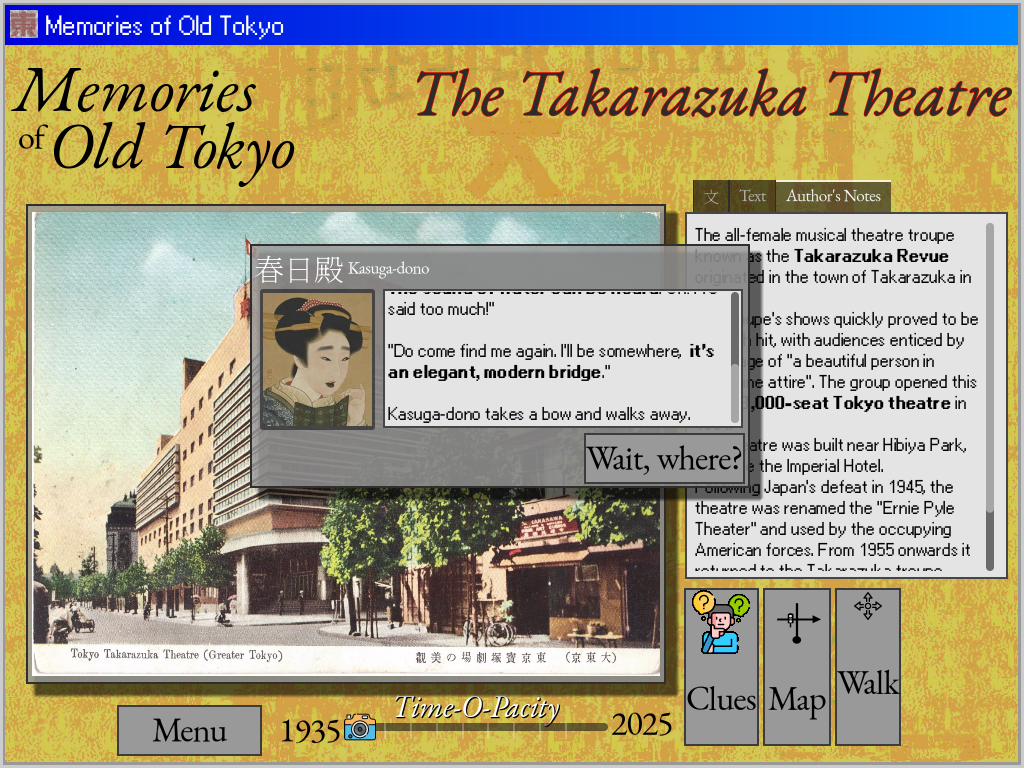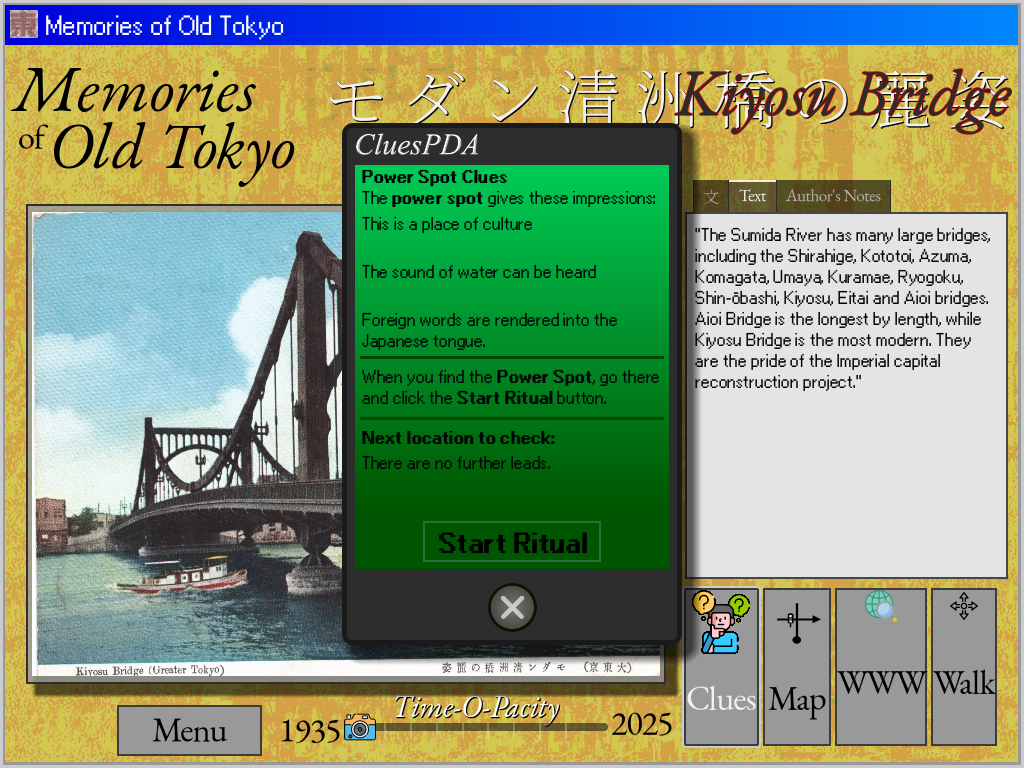Designing the Clues Engine
Ever since playing Return of the Obra Dinn - or was it Her Story - or even Digital: A Love Story? - I have been obsessed with detective games. So, I suppose it was inevitable that at some point I would end up designing my own game where you make deductions from clues to find an answer.
I don't think, at this stage in my game design career, that I could make puzzles as satisfying as Lucas Pope or Sam Barlow. But I hope I can make a game with puzzles that are at least somewhat interesting, varied, and challenging while remaining fair to the player.
The clue loops
At the start of the game, the player is tasked with finding a treasure. To do that, they have to answer some questions about the treasure - without knowing anything about it. For this impossible task, supernatural aid is required.
After the opening, the player finds themselves in a random Tokyo postcard, in front of a riddler picked at random from the game’s cast of characters.

The player’s first task is to find the next Power Spot. The Power Spot is a special postcard that holds a secret about the treasure - but the player needs to solve a few riddles first before they can find the Power Spot.
Cluing the Power Spot
In the game data, every postcard has clues attached. Some of these clues are general clues, and apply to many postcards: for example, “infrastructure”, “near water”, “temple”. The game assigns a difficulty to each clue based on how broad it is - for example, “all-woman theatre” applies to exactly 1 postcard, and has a difficulty of 1, while “near water” is a very broad term and applies to perhaps 10 postcards, so it has a difficulty of 10.
To keep things interesting, to begin, the riddler selects a hard general clue that could apply to many locations. To make things more varied, a clue like “near water” will have several different wordings, or “hintings”:
- “The sound of waves can be heard.”
- “It has the sensation of rushing water.”
- “This might be a good place to fish. Or for fish.”
The riddler introduces themselves and then gives the player their first power spot clue.

Deducing the Power Spot
My original intention was to make the Power Spot impossible to guess from one clue, but I realised it’s more fun for the player if they occasionally get a freebie - it’s always nice, as a player, to feel like you’ve got away with “cheating” the game (like when you get a game-breaking Joker in Balatro). For example:
- Some “broad” clues are actually very specific. If the clue was “Tokyo Bay”, it's a large area in real life, but the only postcard in the game near it is “Haneda Airport”.
- A postcard is only used once for a clue. After 1 or 2 loops, the player might have ruled out some previous locations. For example, if the clue suggests a bridge, and they already visited 2 out of 3 bridges, the player can guess it’s the 3rd bridge.
- Earlier in the game, and on easier difficulties, fewer locations are presented to the player. So the player might get lucky, and only get one “near water” pin on the map.
However, if they can’t work it out, the player has to…
Follow the breadcrumbs
The riddler will hint that there are more clues to follow, and will drop a breadcrumb clue. This is a more direct, easier clue to a postcard, e.g.:
“If you need me, I’ll be on an elegant bridge across the River Sumida”.

If I write these clues well, they should present a little challenge but not be that hard to follow.
When the player reaches the next “breadcrumb”, they’ll get another general clue. At this point, the player can check their CluesPDA and see that they have the following clues:
“The sound of water can be heard.”
“This is a place of culture.”
At this point, perhaps the player will guess that this is some kind of theatre near water - and they might head to the Imperial Theater which lies next to the moat of the Imperial Palace grounds. But if not, they will have to find the next breadcrumb and unlock one of the…
Crossword clues
Recently I got addicted to American-style crosswords such as the daily New York Times puzzle. Despite several attempts, and despite being a (relatively?) smart(?) person, I have never been clever enough to solve a UK-style cryptic crossword - which was something my dad excelled at. However, I find the American clues to be hard enough that they aren’t just synonyms, but not so cryptic that my brain shuts down.
Yesterday, I realised crossword-style clues would be perfect for a game like this. Not too difficult, but just enough to stretch the player’s brain. The general clues can guide them in; to keep things interesting, I can write several clues for every location, and pick them randomly so that the player is challenged for longer. Plus, if the player’s really stuck, they can follow the next breadcrumb and find another clue, at least as long as the clues last.
Also, if I find myself mindlessly filling in crosswords on my phone instead of something constructive, I can tell myself I’m “doing research”.
Wrapping it all up
At this point, things should be pretty clear for the player. Ideally, with around three or four clues, they should be confident enough to go to the power spot and hit the ritual button. If they got it right, they’ll unlock a clue about the treasure. If they got it wrong … well … that’s rituals for you.

Hopefully, this system enables me (as a solo dev) to create a game that’s interesting, challenging, and varied, without too much work on my part apart from coming up with good clues.
I don’t think this system is finalised, though. It doesn’t quite feel perfect to me yet - in particular, I don’t want it to feel like a “trivia test”, and there’s a danger that if the presentation isn’t right, it will fall a bit flat. I admire games like Her Story or The Roottrees are Dead for being able to cloak a simple mechanic (essentially “enter the right string in this box”) in enough layers of mystery and puzzle-solving that they feel like you’re unravelling a real mystery. Hopefully I can achieve at least a little bit of that.
Get Memories of Old Tokyo
Memories of Old Tokyo
Postcards from 1930s Tokyo, presented with the latest CD-ROM multimedia technology.
| Status | In development |
| Author | Bolerosoft |
| Genre | Educational |
| Tags | 2D, Historical, Relaxing, Retro, Singleplayer |
| Languages | English |
More posts
- Massive photo acqusition and new walkabout mode!May 18, 2025
- Beta version released!Apr 29, 2025
Leave a comment
Log in with itch.io to leave a comment.